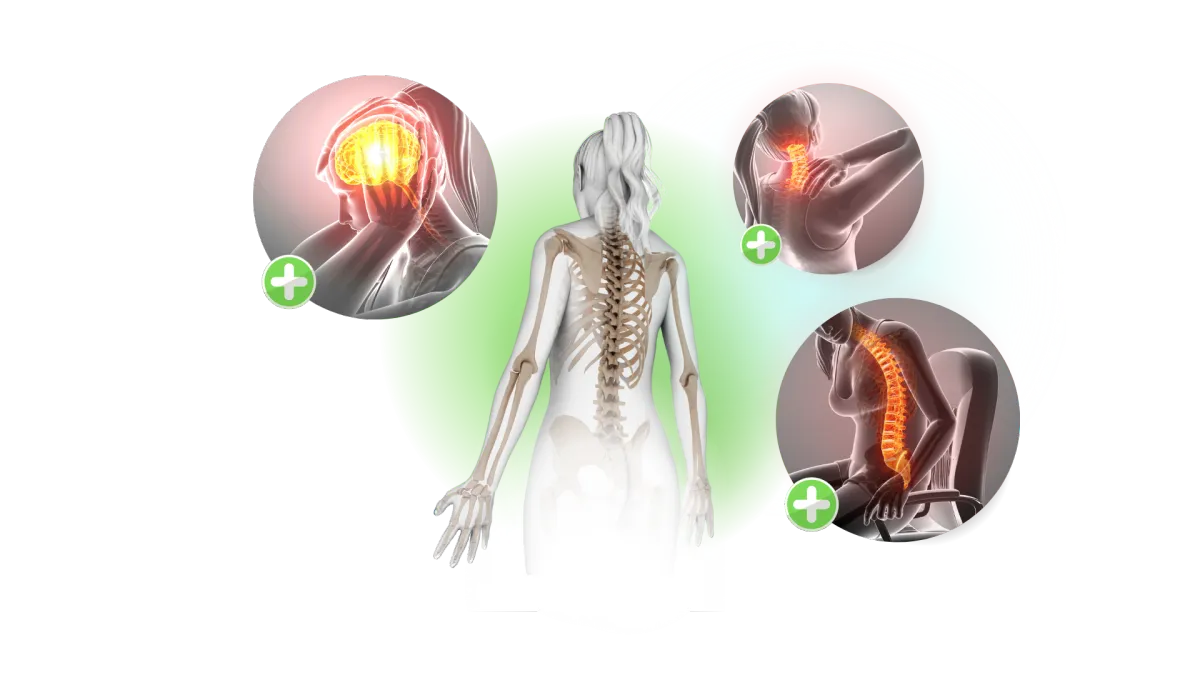12 Weeks To Health
Are you tired of living with chronic long-term back pain, neck pain, or headaches?
Have you tried everything, from pain medication to physical therapy, and still can't find relief?
If you're ready to take control of your spinal health and find relief from pain, click the button to schedule your free assessment now. We look forward to helping you live your best life, pain-free.
Your Spinal Health
Registered chiropractic care in Penrith, Cumbria
5 Poets Walk, Penrith CA11 7HJ · 01768 899 036
Your Trusted Spinal Health Experts
At Your Spinal Health, we are passionate about helping you achieve your best health and well-being. We have been serving our community for over 20 years with a commitment to providing the highest quality care.
Combining natural hands-on treatment with our week-on-week progressive system to help symptoms like back pain, neck pain and headaches.

Start NOW. Just 1-click away
Enjoy family days out without being stopped by pain
Save On Your Treatment Costs
Each visit is £50.
Save if you choose to pre pay.

Start NOW. Just 1-click away
Enjoy family days out without being stopped by pain
MEET THE FOUNDER & CEO
I'm Peter Bennett!
Peter Bennett is a chiropractor in Cumbria with over 25 years of experience helping people overcome back pain, stiffness, and mobility problems — naturally. At Your Spinal Health, his focus is on finding the root cause of spinal problems and restoring lasting balance, strength, and function without cracking or forceful manipulation.
Peter’s gentle, science-based approach supports the body’s own healing process, helping clients not only relieve pain but also improve posture, coordination, and confidence in movement.
Through Your Spinal Health, Peter combines in-clinic care with online self-help programs to empower people to understand their spines, take simple daily actions, and enjoy more years of active, pain-free living.

FAQS
What conditions can we help with?
Spinal health care can help a wide range of conditions, including back and neck pain, headaches, sciatica, joint pain, and even issues related to posture. It's not just about addressing the symptoms; it's about improving your overall health and well-being by improving the health of your spine and nervous system. If you have specific concerns or questions about your condition, please don't hesitate to ask for a consultation to discuss how spinal health care can benefit you.
Is spinal health care safe, and are the adjustments painful?
Spinal health care is generally considered safe when performed by trained professionals. The adjustments are typically not painful; in fact, many clients report feeling relief and improved mobility after an adjustment. Our spinal therapists are highly skilled and will use gentle techniques tailored to your individual needs. Your comfort and safety are our top priorities, and we will explain every step of the process to ensure you feel at ease during your sessions.
How many visits will I need to see results?
The number of sessions you'll need depends on various factors, including the nature and severity of your condition, your overall health, and your treatment goals. Some clients experience relief after just a few sessions, while others may require more ongoing care. During your initial Spinal Health Assessment, our therapists will assess your specific situation and provide a personalised treatment plan. Our goal is to provide efficient and effective care, so you can return to a pain-free and healthy lifestyle as soon as possible.

Your Sense of Smell and the Hidden Role of Your Spine
The Power of a Simple Scent
Imagine waking up to the smell of fresh coffee or catching the scent of flowers on a spring day. Smell is deeply tied to memory and emotion—it’s part of what makes life rich and vivid.
But what happens when your sense of smell isn’t as sharp as it should be? Many people blame sinuses or ageing, but your spine and nervous system can also play a part.
The Nerves Behind Smell
Your sense of smell starts with the olfactory nerves in your nose, which send information to your brain. These nerves are cranial nerves, not spinal nerves—but here’s the important connection:
Your brain needs a steady flow of clear nerve signals and blood supply to process smells correctly. And that communication depends on a healthy, aligned spine.
As Gray’s Anatomy reminds us:
“The nervous system controls and coordinates all the functions of the body and relates the individual to his environment.”
If the cervical spine (neck) is misaligned, it can affect blood flow and nerve communication to the brain regions that interpret smell.
Did You Know?
You don’t smell “reality” directly. Your nose collects scent molecules, but it’s your brain that builds the experience of smell.
If the nerves carrying that information are disrupted—or if your brain isn’t receiving clear signals—the result can be:
Reduced or altered sense of smell.
Sinus pressure headaches.
Even a change in how food tastes (since taste and smell are closely linked).
How Spinal Misalignment Can Affect Smell
A misaligned neck can:
Irritate nerves that contribute to sinus function, creating pressure or blockage.
Reduce blood supply to brain regions involved in smell perception.
Interfere with sensory integration, where smell and taste are combined into flavour.
Trigger headaches or facial pain that make smells feel overwhelming or dulled.
Common experiences include:
Food tasting “flat” or “different.”
Difficulty smelling subtle scents.
Sinus pressure or congestion not explained by allergies.
Headaches made worse by strong odours.
Simple Tip to Support Smell and Sinus Health
Breathing deeply and moving your neck freely helps both oxygen and nerve signals reach the brain.
Try this:
Sit upright and take five slow, deep breaths, expanding your ribcage fully.
As you breathe, gently turn your head side to side within a comfortable range.
This simple exercise improves posture, relieves tension in the neck, and supports clearer breathing.
Takeaway
Your sense of smell doesn’t just depend on your nose—it depends on your nervous system and brain interpreting signals correctly.
When your spine is misaligned, that delicate communication can be disrupted, leaving you with dulled senses or sinus discomfort. Looking after your spine is one more way to keep life smelling sweet.

